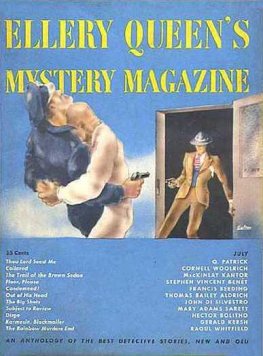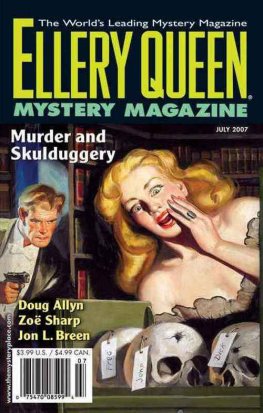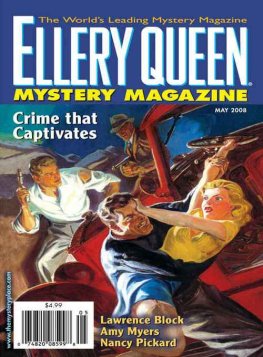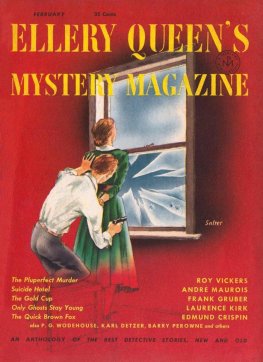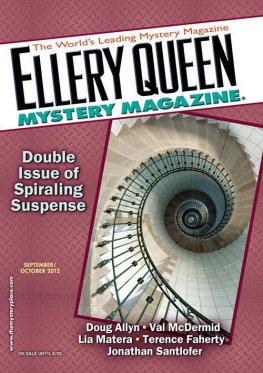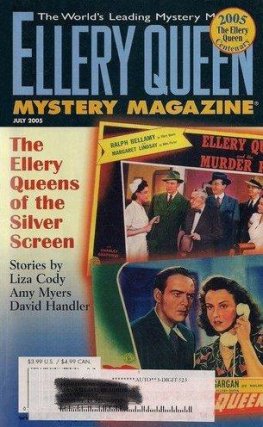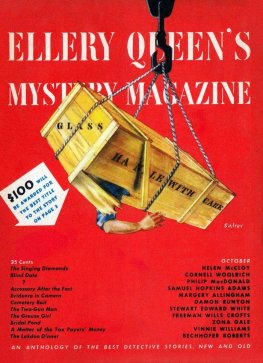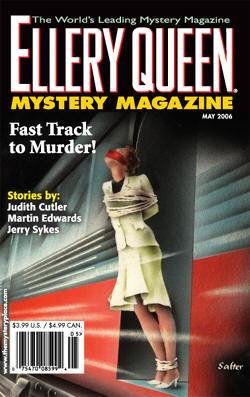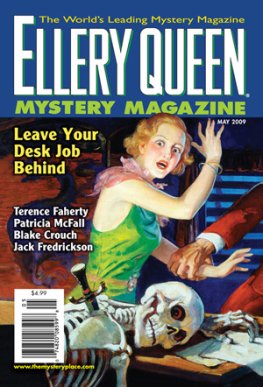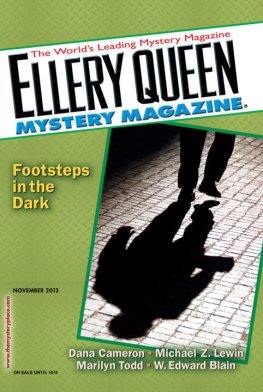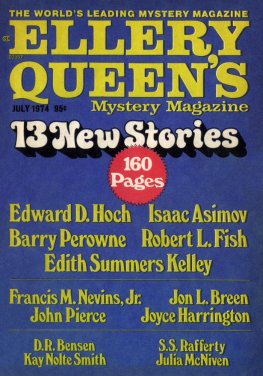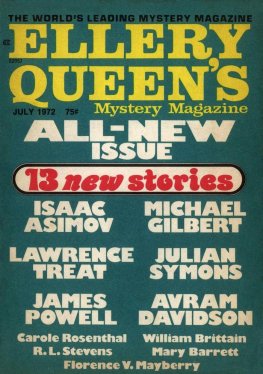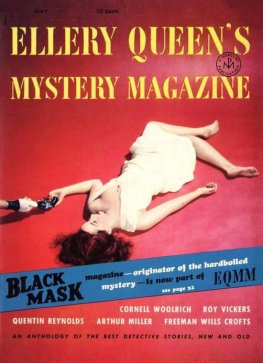Thomas Aldrich - Ellery Queen's Mystery Magazine, Vol. 14, No. 68, July 1949
Here you can read online Thomas Aldrich - Ellery Queen's Mystery Magazine, Vol. 14, No. 68, July 1949 full text of the book (entire story) in english for free. Download pdf and epub, get meaning, cover and reviews about this ebook. City: New York, year: 1949, publisher: The American Mercury, genre: Detective and thriller. Description of the work, (preface) as well as reviews are available. Best literature library LitArk.com created for fans of good reading and offers a wide selection of genres:
Romance novel
Science fiction
Adventure
Detective
Science
History
Home and family
Prose
Art
Politics
Computer
Non-fiction
Religion
Business
Children
Humor
Choose a favorite category and find really read worthwhile books. Enjoy immersion in the world of imagination, feel the emotions of the characters or learn something new for yourself, make an fascinating discovery.
- Book:Ellery Queen's Mystery Magazine, Vol. 14, No. 68, July 1949
- Author:
- Publisher:The American Mercury
- Genre:
- Year:1949
- City:New York
- Rating:3 / 5
- Favourites:Add to favourites
- Your mark:
- 60
- 1
- 2
- 3
- 4
- 5
Ellery Queen's Mystery Magazine, Vol. 14, No. 68, July 1949: summary, description and annotation
We offer to read an annotation, description, summary or preface (depends on what the author of the book "Ellery Queen's Mystery Magazine, Vol. 14, No. 68, July 1949" wrote himself). If you haven't found the necessary information about the book — write in the comments, we will try to find it.
Ellery Queen's Mystery Magazine, Vol. 14, No. 68, July 1949 — read online for free the complete book (whole text) full work
Below is the text of the book, divided by pages. System saving the place of the last page read, allows you to conveniently read the book "Ellery Queen's Mystery Magazine, Vol. 14, No. 68, July 1949" online for free, without having to search again every time where you left off. Put a bookmark, and you can go to the page where you finished reading at any time.
Font size:
Interval:
Bookmark:
Ellery Queens Mystery Magazine, Vol. 14, No. 68, July 1949

Thou lord seest me
by Q. Patrick
Q. Patrick has won a prize in all four EQMM contests to date and may they continue to, ad infinitum. The four prizewinning stories are, from every possible standpoint, a quality quartet Witness for the Prosecution, Love Comes to. Miss Lucy,Mother, May I Go Out to Swim? and now, Thou Lord Seest Me. Indeed, we wonder seriously if many detective-story writers can match that foursome with short stories produced in the last four years...
The title of this years tale derives, of course, from the Bible. The original wording, in the 16th chapter of Genesis, 13, reads: Thou God seest me. This was a popular text chosen by mailers of Victorian samplers remember seeing them framed, on parlor tables and on walls?but for some reason difficult to analyze the sampler-makers could not bring themselves to use the word God. So, it became: Thou Lord Seest Me and in that form started Q. Patrick on their creative labors.
The more obvious sources of the story are twofold: a trip to England during the war and a brooding on the human need for love. The terrible food shortage in London suggested a plot in which the authors could show how lack of food and the great longing for it can disrupt family life and bring about a whole complex of antagonisms in a society hitherto accustomed, to relative plenty. But this larger theme got sidetracked when the authors noticed an ordinary, shabby, dispirited little office worker getting into a bus to go home; the vision of this little mans probable home life, with a probably dreary wife, in a probably dreary suburb and lo, the character of Mr. Loomis was born the little office worker who craved affection so deeply that... But we must not tell too much.
In the cauldron of creation the food shortage was mixed in, and the text of the Victorian sampler, and a fantasy of love, and a golden santonin world. Not the Shakespearean brew of eye of newt, and toe of frog, wool of bat, and tongue of dog, but boiling i the charmed pot you will find the one ingredient which remains constant the poisond seeds of murder...
The office clock struck five. Mr. Loomis looked up at it and frowned. Mr. Loomis hated and feared five oclock as most men fear death. And for him it was the death of each days life since it meant leaving the office. It was only in the office that Mr. Loomis felt himself a man of stature and importance.
He closed his ledger and with a little sigh carried it over to the safe. He spent as long as he could tidying up his already meticulous desk. He arranged his pencils in a neat row, first vertical then changing them to horizontal; he shuffled his inkpots and next went to fetch his hat and coat. As he appeared from the cloakroom, wearing his old bowler and his black coat with its worn velveteen collar, he looked like any tired little man in post-blitz London. His mustache was frayed like his cuffs; his front teeth needed attention; and he stooped too much for a man of fifty.
His office day was over. Now there remained only the pleasure of saying good night to Miss Henderson. Mr. Loomis hastened his footsteps slightly as, passing downstairs, he saw there was still a light in Mr. Tinkers office. Rose Henderson was secretary to the president. She was also sales manager and occasionally for Tinker and Smythe dealt largely in patent medicines for children Mothers Service Manager. The latter term was used when she signed letters dealing with the Croup Elixir or the Worm Eliminant which were two of the firms best sellers.
Been kept busy, Miss Henderson? It was the usual formula repeated almost daily for years.
So, so, Mr. Loomis. Im just finishing off a few letters.
Rose Henderson looked up and smiled, showing almost perfect teeth. Unfortunately they were her only really good feature. Her nose was too wide and behind their rimless glasses, her eyes were too small. Her hair always looked like the nest of a clean but untidy heron. Nevertheless, Mr. Loomis liked her appearance.
In fact, being an incurable romantic, he had been perhaps a shade in love with her for quite a number of years. Oh, it was a perfectly respectable sentiment, for Mr. Loomis was very much a married man. Indeed, he would not have known Miss Hendersons Christian name had he not, as the firms cashier, had to make out a salary check to Rose K. Henderson every month. Sometimes he wondered what the K. stood for.
It had all started with the faded snapshot of herself which Miss Henderson had showed to Mr. Loomis, just for a lark, about ten years ago, at the picnic celebrating Mr. Tinkers wedding. It portrayed bare-legged little Rosie Henderson at the age of eight, happily sucking a stick of candy rock on the sands of Burnham-on-Sea. Mr. Loomis had purloined this picture shamelessly and kept it face downward in a locked drawer of his desk at home. Occasionally, he took it out and thought to himself how Miss Henderson, who must now be about forty, should by rights be the mother of several little girls who looked just like that. And perhaps he thought that if he and Miss Henderson...
But, no. It must be repeated that Mr. Loomis was married to a most estimable and faithful wife whose lips had never touched liquor, tobacco, or those of any man but her husband.
Well, good night, Mr. Loomis.
Good night, Miss Henderson.
Mr. Loomis put on his bowler again and passed out into the thick miasma which is Clerkenwell on a January evening. He saw with some satisfaction that there was quite a long queue waiting for the Pimlico bus. With any luck he would miss the first one, possibly the second, and thus delay the ineluctable moment when he would have to knock on his front door and find himself at home.
As he waited, his fingers ran mechanically through his pockets. The contents would have disgraced any self-respecting schoolboy. There were two lumps of sugar, the rock cake (twopence extra) carefully saved from his tea. There was also a cough lozenge, half a biscuit wrapped in an old invoice and two of the firms medium-sized manila envelopes. Into one of these Mr. Loomis squeezed his squirrel hoard with some satisfaction, for these fragments were offerings intended for the gratification of his most recently acquired daughter.
Mr. Loomis, a father, who had missed his vocation, adored little girls. He had had scores of daughters and he had wooed them in scores of different ways. There was blue-eyed Lucy Green of the ringlets whose heart he had won with fretwork toys made secretly in his own tiny workshop. There was short-haired, freckle-faced Belinda Wren (now a mother herself) for whom he had ransacked his wifes ragbag to make stuffed dolls and teddy bears. There were many others, plain and pretty, whose faces had lit up eagerly at the sight of Daddy Bloomers.
His latest love was Dinah Milton who had recently come to live with her mother in the house next door. She was a wisp of a child with an appetite which would have done credit to a regiment of guardsmen. But Mr. Loomis saw her skinny little frame through rosy spectacles for she reminded him a tiny bit oh, such a tiny bit of the little girl whose faded snapshot he kept locked in his drawer.
There was something particularly touching about Dinahs greediness because the shortage of food in England was hard on hungry little girls. An added bond was the fact that Mrs. Loomis disapproved monumentally of the easy-going habits of Dinahs mother. That she disapproved of Dinah herself went without saying. Mrs. Loomis childlessness had not made her sympathetic toward the offspring of others.
Font size:
Interval:
Bookmark:
Similar books «Ellery Queen's Mystery Magazine, Vol. 14, No. 68, July 1949»
Look at similar books to Ellery Queen's Mystery Magazine, Vol. 14, No. 68, July 1949. We have selected literature similar in name and meaning in the hope of providing readers with more options to find new, interesting, not yet read works.
Discussion, reviews of the book Ellery Queen's Mystery Magazine, Vol. 14, No. 68, July 1949 and just readers' own opinions. Leave your comments, write what you think about the work, its meaning or the main characters. Specify what exactly you liked and what you didn't like, and why you think so.

